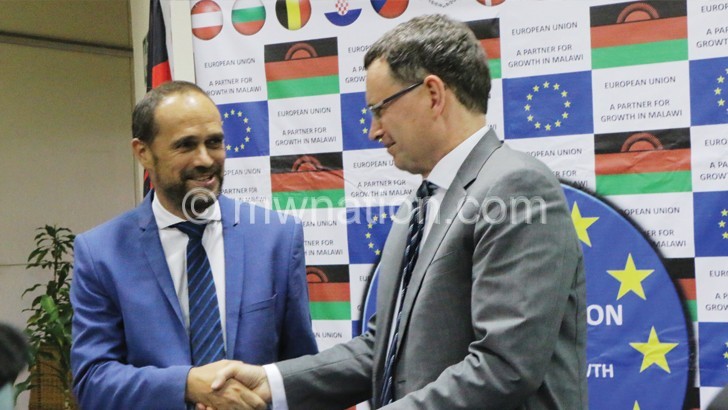EU says power interconnector not absolute solution
The European Union (EU) has cautioned that the electricity interconnector between Malawi and Mozambique is not a lasting solution to power supply challenges facing the country.
EU Ambassador Marchel Gerrmann expressed the sentiments in Lilongwe yesterday during the signing of an agreement with German Development Bank (KfW) to provide a grant for the financing of the Malawi part of Malawi-Mozambique Interconnector.

He said Malawi should consider other renewable power sources, including solar, which can provide stand-alone power solutions to some of the country’s energy problems.
Said Gerrmann: “Globally, we see a transition to more renewable forms of energy such as solar and wind. I think the environment in Malawi makes it conducive for solar energy and from that respect I think Malawi should benefit from this advantage that it has.”
KfW will provide 20 million euro grant for the funding of the Malawi side of the Malawi-Mozambique Interconnector that, when completed, will enable the country import electricity from the southern African countries of South Africa and Mozambique.
KfW director for Southern Africa, Thomas Duve, echoed Gerrmann’s comments, saying that the project needs to be complemented by other interventions for the country to be able to achieve a level where the positive impact of the project can be felt.
On cost reflective tariffs, Electricity Supply Corporation of Malawi (Escom) chief executive officer Alexon Chiwaya said discussions are underway on the same where the country’s energy regulating body, Malawi Energy Regulatory Authority (Mera), will have a say on the final tariffs.
The signing of the grant financing agreement set the pace for the paperwork with potential financiers to facilitate purchase of power through interconnection with Mozambique and Zambia national grids in a bid to ease prolonged electricity supply challenges that threatens to ground the economy to a standstill.
Malawi is facing acute power supply challenges with hydro-electric generation capacity reduced to around 200 megawatts (MW) from the installed generation capacity of 351MW and peak demand of 350MW due to reduced water levels in Lake Malawi and its sole outlet, Shire River, where over 90 percent of electricity is produced.
In October 2016, Escom indicated that it was turning to Mozambique as an alternative source of energy through an interconnection project set to materialise in 2020.
Escom said the project would involve construction of a 210-kilometre (km) 400 kilovolts (kV) power transmission line from Matambo Substation in Tete, Mozambique to Phombeya Substation in Balaka.
The revival of the power interconnection project comes after a similar deal was rejected by the Bingu wa Mutharika administration reportedly due to cost implications. n





